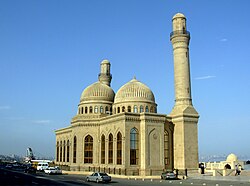| Islam by country |
|---|
 |
|
|
| Part of a series on |
| Azerbaijanis |
|---|
| Culture |
| Traditional areas of settlement |
| Diaspora |
| Religion |
| Language |
| Persecution |


Islam is the majority religion in Azerbaijan, but the country is considered to be the most secular in the Muslim world.[2] Various reports have estimated 97.3% (CIA, 2020)[3] or 99.2% (Pew Research Center, 2006)[4] of the population identifying as Muslim; with the majority being adherents of the Shia branch (55-65%), while a significant minority (35-45%) are Sunnis.[5][3][6] Traditionally, the differences between these two branches of Islam have not been sharply defined in Azerbaijan.
Most Shia Muslims in the country follow the Ja'fari school of Shia Islam, while Sunni Muslims typically adhere to either the Hanafi or Shafi'i school.[7] Due to many decades of Soviet atheist policy, religious affiliation in Azerbaijan is often nominal and Muslim identity tends to be based more on culture and ethnicity than on religion. Shia Islam is prevalent in the western, central, and southern regions of the country. Traditionally, villages around Baku and the Lankaran region are considered Shia strongholds. In contrast, Sunni Islam is dominant in the northern regions.[7]
- ^ "Muslim Population Growth in Europe Pew Research Center". 2024-07-10. Archived from the original on 2024-07-10.
- ^ "Islam and Secularism: the Azerbaijani experience and its reflection in France". PR Web. Archived from the original on February 14, 2015. Retrieved 2013-08-16.
- ^ a b "Middle East :: Azerbaijan — The World Factbook". Central Intelligence Agency. Retrieved 2023-07-09.
- ^ "Interactive Data Table: World Muslim Population by Country". Pew Research Center. 7 October 2009. Retrieved 2020-08-09.
- ^
Sources:
- "2021 Report on International Religious Freedom: Azerbaijan". U.S Department of State. 2 June 2022. Archived from the original on 4 June 2022.
According to 2011 SCWRA data (the most recent available), 96 percent of the population is Muslim, of which approximately 65 percent is Shia and 35 percent Sunni.
- Greenger, Nurit (8 May 2017). "Azerbaijan a Destination Worthwhile. My week travel log in Azerbaijan - Day two". The Jerusalem Post. Archived from the original on 19 January 2023.
- Balci, Bayram (18 March 2013). "The Syrian Crisis: A View from Azerbaijan". Carnegie Endowment for International Peace. Archived from the original on 18 January 2022.
- Ismayilov, Murad (2018). "1: Hybrid Intentionality and Exogenus Sources of Elite's Manifold Attitudes to Islam in Azerbaijan". The Dialectics of Post-Soviet Modernity and the Changing Contours of Islamic Discourse in Azerbaijan. London SE11 4AB: Lexington Books. p. 2. ISBN 9781498568364.
the country's population historically divided between the Shia (currently some 50-65 percent of the population) and the Sunni (about 35-50 percent).
{{cite book}}: CS1 maint: location (link) - S. Nielsem, Jorgen; Balciz Goyushov, Bayram, Altay (2013). "Azerbaijan". Yearbook of Muslims in Europe: Volume 5. Leiden, The Netherlands: Brill. p. 65. ISBN 978-90-04-25456-5.
quote:"While traditionally approximately 65% of local Muslims are considered Shi'i and 35% Sunnis, due to a great success of international Sunni missionary organisations after the collapse of the Soviet Union, currently the estimated number of practicising Sunni and Shi'i Muslims in the big urban areas are almost equal"
{{cite book}}: CS1 maint: multiple names: authors list (link) - Whitaker's Shorts 2015: International. Bloomsbury. 2014. ISBN 9781472914842.
- "2021 Report on International Religious Freedom: Azerbaijan". U.S Department of State. 2 June 2022. Archived from the original on 4 June 2022.
- ^ Mammadli, Nijat (7 June 2018). "Islam and Youth in Azerbaijan". Baku Research Institute. Archived from the original on 20 April 2023.
quote:"Also, according to rough estimates, Shiites constitute 60-65% of the Muslim population, and Sunnis – 35-40%."
- ^ a b Mammadli, Nijat (7 June 2018). "Islam and Youth in Azerbaijan". Baku Research Institute. Retrieved 20 April 2023.
